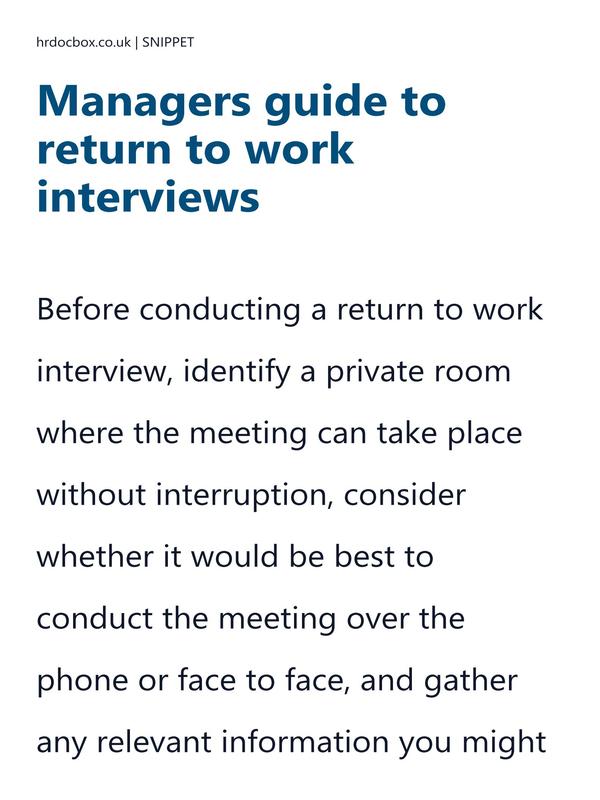Managers guide to return to work interviews


This guide provides guidance on conducting effective return to work (RTW) interviews after periods of absence, helping managers gather relevant information, address any concerns or barriers, and facilitate a smooth transition back to work.
- Includes 12 months' access to the Managers guide to return to work interviews, with all updates provided free of charge and notified to you.
- UK-specific accuracy.
- 729 words over 2 pages.
- Last updated 16/12/2024.
- Format: Word / PDF / plain text / email.
- Delivery: Instant download after purchase (no physical item).
- Access: Download link shown here after checkout.
- This Managers guide to return to work interviews will SAVE you up to 1 hour 30 mins research, save you money, and reduce your risk.
Managers guide to return to work interviews
Before conducting a return to work interview, identify a private room where the meeting can take place without interruption, consider whether it would be best to conduct the meeting over the phone or face to face, and gather any relevant information you might need at hand, such as the employee's absence record or fit note.
It is also a good idea to plan a loose structure for the interview to ensure all bases are covered. Examples of return to work interview questions include:
-
What caused the absence? Was work a contributing factor?
-
Is this an ongoing or recurring condition?
-
Did you see a GP? What was the outcome?
-
How are you feeling now? Do you feel able to return?
-
Could it happen again? Is there anything that can be done to prevent recurrence?
-
What adjustments might help facilitate a return to work? (For example, can changes be made to their working pattern, physical work environment and/or role?)
-
What support do they need to get back on track? (They might need refresher training, a prioritised action plan, etc.)
| Key resources
Return to work interview - model form
Benefits of return to work interviews
Though not
This is a 30% preview of the Managers guide to return to work interviews. For instant full access, purchase this item or a parent bundle.
Managers guide to return to work interviews purpose
The primary purpose of a return to work interview is to welcome the employee back, discuss the reasons for their absence and confirm that they are fit to attend work.
It is also an opportunity to bring the employee up to speed with any changes that have occurred during their absence, develop a return to work plan (which might include making reasonable adjustments), and identify any underlying health concerns that need to be addressed.
return to work interviews workflow
return to work interviews workflow
Check which resources should be implemeted before and/or after the Managers guide to return to work interviews, to understand the workflow.
Absence improvement checklist
Our Absence Improvement Checklist Form Template streamlines tracking and managing employee absences, enhancing productivity and reducing absenteeism.
Return to work interview script
Our Return to Work Interview Script Template streamlines conversations after absence, ensuring consistent documentation and support for employee wellbeing.
Frequently Asked Questions about a Managers guide to return to work interviews
Frequently Asked Questions about a Managers guide to return to work interviews
-
Can I use the Managers guide to return to work interviews in my small business?
Yes. The Managers guide to return to work interviews is designed to be flexible and suitable for organisations of all sizes, including small businesses and charities. It follows UK employment law best practice, so even if you don't have an in-house HR team, you can confidently apply it.
-
Is the Managers guide to return to work interviews compliant with 2026 UK employment law?
Absolutely. Like the Managers guide to return to work interviews, all of our templates are drafted with the latest ACAS guidance and UK employment legislation in mind. We review and update them regularly, so you can be confident they remain compliant.
-
Can I customise the Managers guide to return to work interviews for my organisation?
Yes, we highlight the areas of the Managers guide to return to work interviews that you need to update with your own details, and where you need to make decisions to suit your situation. This saves you time and ensures that you meet best practice.
-
Do I get instant access to the Managers guide to return to work interviews?
Yes. Once purchased, you'll be able to download the Managers guide to return to work interviews instantly. Templates are provided in editable Word or Excel format so you can customise them easily, and in PDF format for easy sharing.
-
What if I need more help, not just a Managers guide to return to work interviews?
If you're looking for broader support, we also offer toolkits and library bundles that include the Managers guide to return to work interviews, along with other HR templates and policies for fully managing your situation. These may be more cost-effective if you need deeper advice.
-
Why should I use this Managers guide to return to work interviews, and not AI to generate it?
The risk of using a free AI-generated template 'without review' includes your legal exposure, missing context, and no awareness of the wider process, whereas purchasing the Managers guide to return to work interviews from us mitigates that risk.
